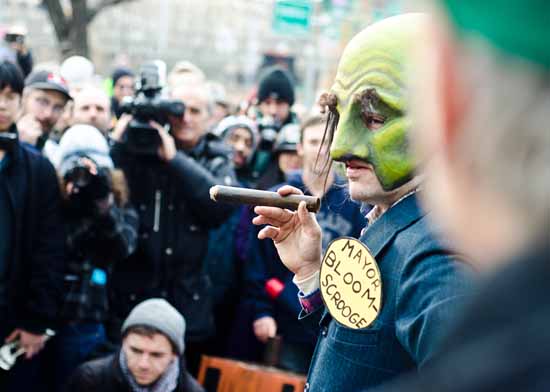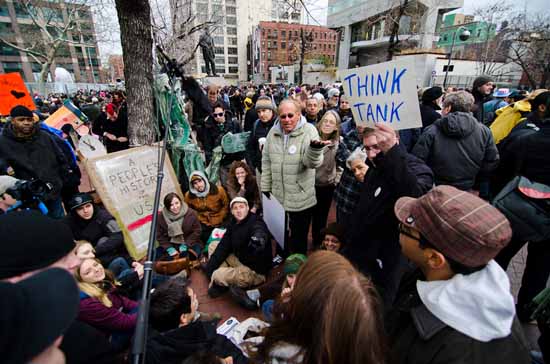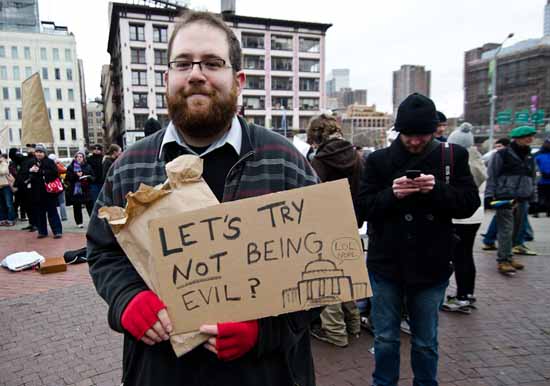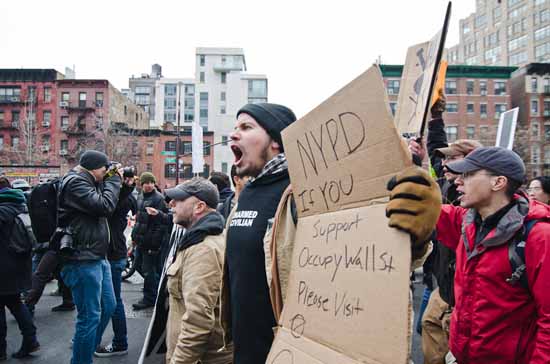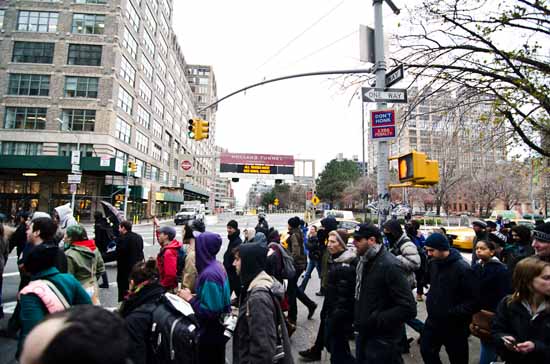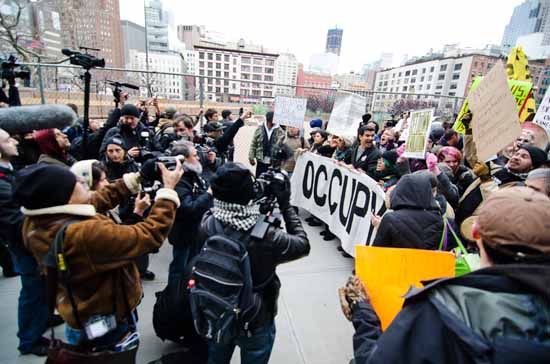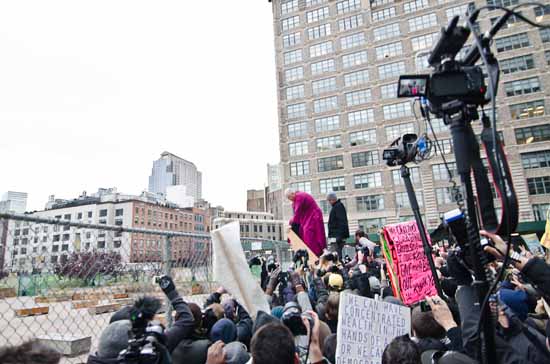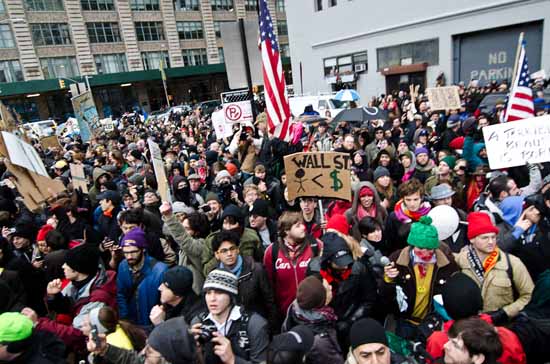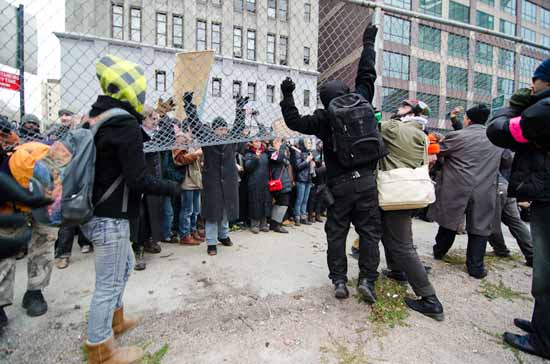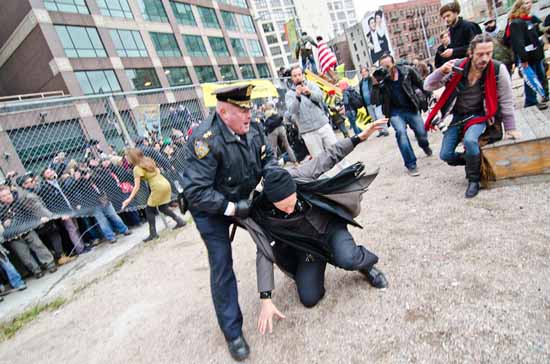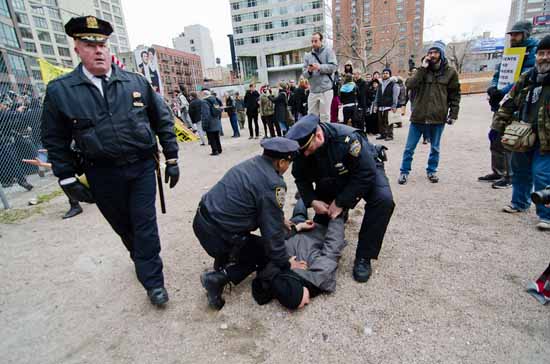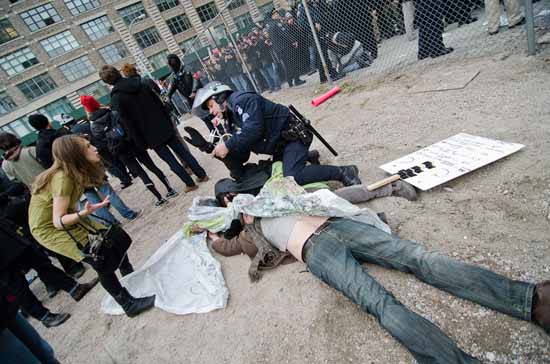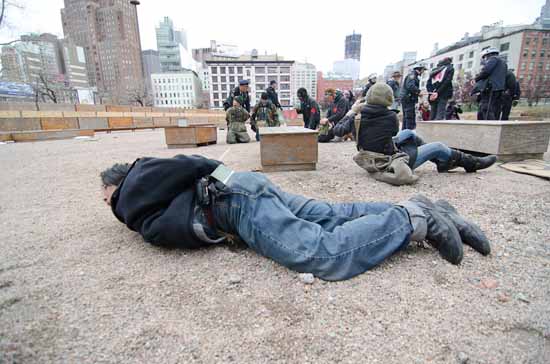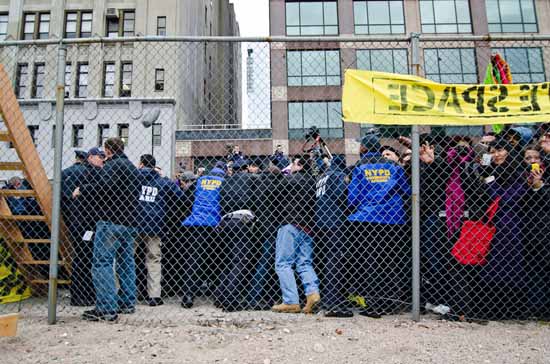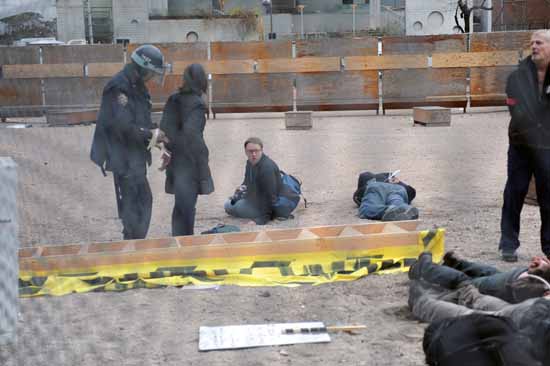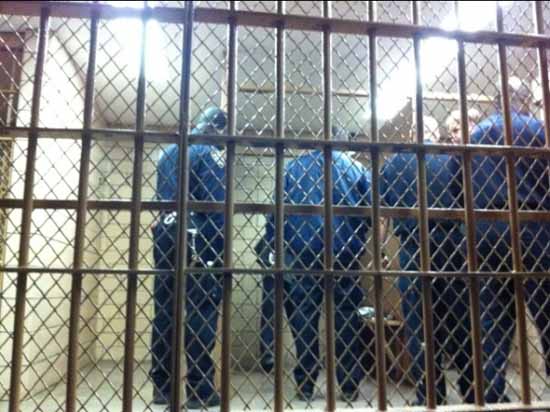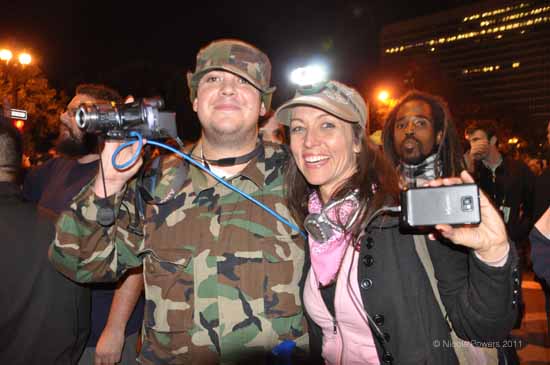
Interview With Justin Sane of Anti-Flag: The Occupy Movement Gives Me A Lot Of Hope3
Posted In Activism,Blog,Entertainment,Interviews,Music,Politics
The dawn of another brutal election year is upon us and the majority of the country has developed a feeling of distain for politics all together. Still, masses of protesters have flocked to the streets to speak out against corporate greed and corrupt government practices. Never has there been a better time for a band like Anti-Flag to make new record and gear up for another world tour.
Anti-Flag frontman, Justin Sane has relentlessly spoken out against injustice since he and his friends formed the band back in 1988. Sane has long been hailed as one of the most intelligent songwriters of our generation. While musically, Anti-Flag is a direct descendent of classic punk rock bands, lyrically they ring reminiscent of a Woody Guthrie or Billy Bragg. Anti-Flag had a few minor hits with songs like “Protest Song” and “Turncoat” which could be heard being played at almost any protest demonstration during the Bush Administration. It is rather common to find Anti-Flag playing shows at protests. They recently played at an Occupy Wall Street Demonstration. Sane draws a lot of his songwriting topics from his experiences playing at and marching in these kinds of events.
Aside from his rigorous touring schedule with Anti-Flag, Sane has also put out three solo records (one full length and two EPs) and is in the process of putting together another album. In these solo records, he has found a freedom to pursue different musical directions – often this means falling back into acoustic music and dabbling in different genres. The light-hearted solo albums are a glimpse at the other side of the charismatic frontman.
In the following interview, Sane and I discuss the roots of his love of music and activism, the causes and effects of the Occupy Wall Street Protests, and the new Anti-Flag album due out this spring.
Justin Beckner: It seems to me that there are a lot of ideological similarities between traditional Irish music and punk rock music. You came from an Irish household, is that where your passion for music and social justice came from?
Justin Sane: Yeah, it really did. My dad is from Ireland and both of my mother’s parents are from Ireland so I am 110% Irish. My parents were both really involved in activism as a result of their Catholic upbringing. In Catholicism, there’s something called “Liberation Theology” and that’s the kind of theology that Jesus preached – that you should help out in your community and work with the poor and stand up for people who can’t stand up for themselves or give a voice to those who don’t have a voice in the world. With the British occupation of Ireland for hundreds and hundreds of years, there’s always been that drive in the Irish people to work for their own liberation. I think that the idea of fighting for people who are oppressed was carried along with those who left Ireland. Those ideas have been well documented in Irish folk music which is something I grew up listening to and playing. My parents had nine kids because Catholics don’t use birth control. I was the youngest of the nine and we all played instruments. It was like our own version of The Pogues or Flogging Molly within our own family. I’m not Catholic myself, I’m not really religious, but I think that I was influenced by that Liberation Theology that my parents were so profoundly influenced by. They fought for civil rights and fought to make the environment clean for their kids.
JB: Were there any non-political bands that you were influenced by on a more technical level?
JS: Yeah, I mean I’ve always loved KISS. I thought they were really cool. I’m sure there were others – I listened to Jackson Browne a lot. I listened to much of the same music my older brothers and sisters listened to and a lot of it wasn’t political. The Beatles were a band that was unanimously liked by everyone in my family and they had their political songs and their non-political songs. So there was a lot of non-political music that I drew influence from.
JB: You’ve spent a fair amount of time at the Occupy Wall Street Protests. Do you think the message that is being sent by the protesters is getting through to those who need to hear it?
JS: I think it’s definitely getting through because the protesters are being addressed quite often with brutal physical force by a police force that has traditionally been used to work for the elite. I think what we have now is a police force that is propping up a corporatocracy. Let’s look at it from this perspective – if there were protests in North Korea where protesters were trying to make a statement by occupying a square in North Korea and the police came in a brutally beat people up and pepper sprayed them and hit them with non-lethal weapons, the State Department here in the US would be on Fox news decrying the authoritarian rulers of North Korea. But we have that exact same thing happening right here in a democracy where we supposedly have the right to free speech. We have peaceful protesters making a peaceful statement and they’re being beat down by police. I think that says something about the state of our nation and it says something about the concern that those in power have about a message like that being freely spoken. If they didn’t think that message was dangerous, they wouldn’t be sending the police out there to shut those people up. There’s a very clear and directed initiative to suppress that speech and I think that’s really tragic. I’m really proud of the people who are out there making that statement because it obviously needs to be made. People are waking up and realizing that the rich in this country have been taking advantage of the poor for a very long time. So, they’re waking up and making the statement that things in this country are very out of balance – in that respect I think it’s very important that statement be made.
JB: That sense of injustice and imbalance has certainly been getting much harder for people to ignore in recent years. The top 1% of Americans control 42% of the country’s wealth and assets. That’s a pretty staggering figure.
JS: Yeah it is and I think in America there’s a sense of fairness – that everybody has an opportunity to get ahead and that’s based on an assumption that there’s a level playing field that we all start out on. Now people are looking around and seeing that there isn’t a level playing field, things are vastly out of balance, and people with a lot of money are actually breaking the law in many cases and doing things that should be illegal to make more money – all this while the rest of us are just trying to scrape by. I think Americans are pretty fair minded – most people are just saying that they want a level playing field and that’s why we see a lot of protests popping up recently.
JB: Over the past couple weeks I’ve noticed major news networks belittling the protesters on Wall Street. How do you feel when you hear people say that the Occupy Protesters don’t know what they want?
JS: I think a lot of people have a hard time verbalizing it, but in their gut they know there’s something out of whack. That’s where I think the media does a really great disservice by putting out things like, “There’s these occupiers out there but they don’t know what they want.” Because the reality is that if you spent five minutes at any of the Occupy events and walked around and talked to some of the protesters, you’d very quickly find out that there are incredibly articulate people who can tell you exactly what they think the problem is, what should change, and they’d give you statistics to back it up. They’d tell you that the corporations have bought and paid for our politicians to the point that they don’t represent us anymore, they represent corporations, and we want corporate money out of politics so we can have our politicians back. Those are the messages that we don’t see on Fox or CNN. When I go to Occupy Wall Street, as I have a number of times in several different cities, I talk to people who are really articulate, and then I turn on the news and they’re interviewing some guy who can hardly talk and doesn’t seem to know why he’s there. It makes me wonder why the hell aren’t they running interviews with the people I talked to when I was there. But those people at the top of the food chain at Fox news and places like that don’t want a clear message coming out of there. They’re doing their best to make people look stupid but the amount of knowledgeable people down at these protests is unbelievable. I just wonder why we’re not hearing those voices on the news.
JB: With the dawn of another election year upon us I’ve got to ask, how do you think these protests are going to influence the elections in 2012?
JS: One thing that was really clever about the way the Occupy movement was structured was that there is no figurehead leading the movement. That’s a good thing because leaders can be coopted, they can be bought, they can be bribed, they can be stroked in different ways. The Occupy movement is a true democratic process and a true movement of the people. I think that politicians today are just too corrupt to bring this country back to some degree or normalcy. However they will do what they need to do to get reelected and in that sense the Occupy movement is a message of what the people want. It’s not a message of what the corporations want. Ultimately politicians have to bow to the will of the people, and little by little, as a result of the Occupy movement, we see that happening. So it’s a step in the right direction. I think that what the Occupy movement is going to do is change things on a broad scale and politicians in turn will be pulled in and forced to think about what the people want if they want to get elected.
It’s going to take time and it’s going to happen as a result of attitudes and ideas changing. One of those ideas that has to change is that we can have corporate money in politics – we just can’t. There are huge payoffs for these politicians. Say I get elected to the senate and I vote with a chemical company in my area even though I know it’s really bad for my constituents. I know that even if I get voted out of office the next term, I’ll still have a cushy job at that chemical company where I can use the friends I made in Washington to benefit my company. This is what happens over and over again. Our former senator or Pennsylvania, Rick Santorum, who is running for president right now, is a poster child for this type of thing. Dick Cheney is another stellar example – he was with Halliburton, then in the Senate, went back to Halliburton, and then was vice president. That is how these corporations use their influence – what we have right now is not a democracy, it’s a corporatocracy and it needs to change. The Occupy movement gives me a lot of hope. I think people went to the ballot box expecting change from Barack Obama and they didn’t get it. They’re realizing that change isn’t going to come from the ballot box and they’re going to find a new way to move the country in a different direction – it’s really exciting and I feel optimistic for the first time in twelve years!
JB: Switching gears back to music, I’ve been told the new Anti-Flag album is in the mixing process right now. Do you have a title or a release date?
JS: Yeah we’re tentatively titling it The General Strike. A general strike is generally where a city or a country is shut down to make a point that progress will not move forward without the people’s labor. The UK had a massive general strike which wasn’t even mentioned in this country’s news. They shut the entire country down. The idea behind calling the new album The General Strike is that it’s a worldwide general strike and Anti-Flag is a band that is talking about unity between all people. I think there really is a group of people who have unified in this world around the idea of equality for all people – and that’s the concept that the title came from.
JB: A lot has happened in the world since your last album; is there any certain subject matter that you focused on with the writing of the new record?
JS: After going to a number of Occupy Wall Street Demonstrations and witnessing the recurring theme of police oppression and the masses of cops working as a tools for what I refer to as the corporate state, that was certainly on my mind when I was writing for the new album. Because I’ll tell you what, when you’ve had a billy club shoved in your face or been pepper sprayed or witnessed innocent people being beat down for absolutely no reason – the videos are on The Daily Show so you don’t have to look very hard to see it – it makes you angry. Especially when it happens to an old lady or people you know, and when you see this happening day after day to peaceful people who are just expressing their democratic right to free speech. So writing about police oppression was something that happened on this record as a result of that. I’ve been having a really hard time looking at police and feeling good about them. It’s really unfortunate because I have police officers in my family and when police do their job and serve their community and protect people, it’s really nice to see them. But we keep seeing over and over again police acting outside what their role is. It’s really enraging and it’s something I’ve been putting pen to paper about because that’s my way of dealing with it.
We’ve also been writing about the exciting events that have been happening around the world like the revolutions in Tunisia and Egypt, the ousting of Moammar Gaddafi, and the changes happening in Saudi Arabia. And then we’ve got a song about skateboarding (laughs). There’s a general theme that the songs are about what’s going on in the world, but we like to have some fun too. It should be out sometime in the spring of 2012.
JB: There will be a tour ensuing the release of that album I’d imagine?
JS: Yeah, we’re looking at starting in Australia and then playing Indonesia for the first time which we’re pretty excited about. Then we’ll definitely be doing our dates in the states and the Europe. After that we’ll see what happens, were always looking forward to meeting new people, seeing new places, and experiencing new things.
JB: I also understand you’ve been writing some songs for a solo record. What do you get out of writing songs for a solo album that you don’t get from writing Anti-Flag songs?
JS: We had an idea when we started Anti-Flag that we wanted it to be a political punk rock band and when people started to follow the band that was the impression they got as well. When we stray from that formula people don’t accept it very well, some react pretty viscerally to it. On the record Bright Lights of America, which we released a few years back, we really tried to expand and go in some different directions and people either liked that about it or they hated it. [Instead of] trying to force people [to hear[ something that they don’t want from Anti-Flag, I write solo albums. With my solo albums, if I want to write about my cat or my girlfriend I can do that. With Anti-Flag I don’t feel free to write songs like that. Another thing is the ability to write different types of music. In my family we listened to so much music and it was so diverse that it almost makes more sense to come across me playing an acoustic guitar in an Irish pub than playing electric guitar in a punk rock band.
The solo albums give me a chance to do something else and that freedom is really exciting. It’s an opportunity for people to know the personal side of me. Sometimes in Anti-Flag people get to thinking that we’re just these serious political robots all the time – it’s kind of funny. Anyways, I’m hoping to get a solo album together in 2012.


